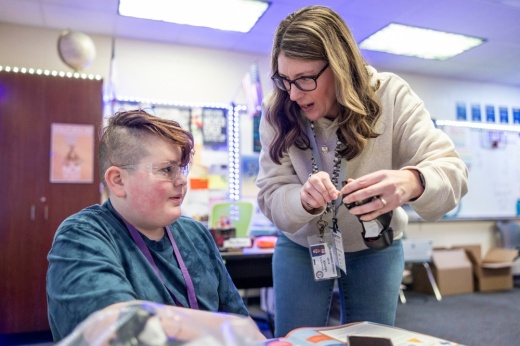Instructional costs in the district are up by $990 per student since 2018-19, affecting day-to-day operations. The district has seen the following expense increases since 2019:
- 25% in construction
- 52% in technology
- 141% in general insurance
- 21% in transportation
- 28% in health insurance
“We’re going to have to make hard choices if we don’t get enough money to pay for that inflation,” Killian said Feb. 6.
What’s happening
To offset the fiscal year 2024-25 shortfall, CFISD cut $58.7 million from the budget, including librarian staff, support staff and bus routes. While district officials said schools are scrambling statewide to absorb the costs, the Texas Legislature is reviewing several bills this session that could potentially increase state funding for public schools.Public schools in Texas receive a base $6,160 per student annually, but this rate hasn’t been increased since 2019, CFISD Chief Financial Officer Karen Smith said. She said she believes legislators should increase the basic allotment by $1,300 to bring the district’s funding back to where it was in 2019.
House Bill 2 proposes a $220 boost to base school funding, changes to special education funding and more. The proposal would invest nearly $7.6 billion in public education, Community Impact previously reported.
Bill author Rep. Brad Buckley, R-Salado, said this would be “a larger investment for Texas public schools and our education system than any other legislation we’ve filed in the history of the state.”
Chronic absenteeism in CFISD grew from 5.5% in 2019-20 to 22% in 2021-22 also impacting school funding as well as academics and student engagement, officials said.
The action taken
CFISD is advocating for additional funding by engaging with local legislators during the 89th legislative session, which began Jan. 14.
District officials said the lack of funding has led CFISD to establish legislative priorities such as:
- Changing the state’s funding formula for the local optional homestead exemption as CFISD’s 20% property tax break results in $91 million in lost property tax revenue annually
- An increase in the safety and security allotment
- An increase in the special education allotment and the transition to an intensity-based funding formula, which would set student allotments based on required services
- An increase in the transportation allotment, which has remained unchanged since the 1980s
While the district continues to exceed the state average in most subjects and grade levels of the State of Texas Assessments of Academic Readiness, CFISD saw lower math passage rates on the 2023-24 STAAR for every grade level compared to 2018-2019, according to Texas Education Agency federal report cards.
CFISD Chief Academic Officer Tonya Goree attributed this decline to lingering gaps from the pandemic, the shift to online learning and changes in the STAAR test format.
“Foundational math concepts were disrupted during virtual learning, making it challenging to close gaps while keeping pace with new curriculum requirements,” Goree said in an email.
At the high school level, Goree said academic recovery continues, with performance in biology and U.S. history returning to pre-pandemic levels and English II exceeding pre-pandemic passage rates. Algebra I and English I continue to make progress toward pre-pandemic levels, Goree said.
In response to learning loss, Goree said CFISD has invested in professional development, introduced student support programs such as free math and reading summer camps, implemented full-day pre-K, and extended the school day by 15 minutes.What’s being done
Teacher experience data from the TEA shows district educators who are new to the field increased by 4.4 percentage points since 2019. According to the TEA's federal report cards for CFISD:
- 152% more teachers have emergency or provisional credentials since the pandemic
- 7.6% of educators were new to the field in 2024—up from 3.3% in 2019
- 177 more teachers are not teaching in the subject or field for which the teacher is certified or licensed since the pandemic
- Recruiting at Texas university programs
- Implementing paid-teacher residencies
- Hosting targeted events for certified teachers
- Providing internship opportunities
- Offering a teaching and training program for high school students
Traci Schluter, CFISD director of psychological services, said that immediately post-pandemic, students, staff and families in the school district experienced the same negative effects as the rest of the nation.
“CFISD is fortunate to have a wide range of mental health resources available to students who are experiencing challenges,” Schluter said in an email statement.
- Guidance and counseling support, and school psychologists at every campus
- School-based social workers who directly address mental health needs and connect families with community resources
- Mental health intervention team supports campuses and procedures when working with high-risk mental health concerns
- Free employee assistance program and wellness counseling program for staff
- Self-care, personal management and stress relief workshops
- “We’re doing a lot more with less, and we really need ... our Legislature to realize that we need more money. If you go through every year cutting, people start leaving a school district. ... I really fear for the future if we don’t get more funding.” -Doug Killian, CFISD superintendent
- “I’m thankful that my school districts, like Cy-Fair, ... prioritize this tax relief [via the local optional homestead exemption] for their residents at the expense of raising additional tax revenue.” -State Rep. Lacey Hull, R-Houston
- “When UPS and Amazon had to increase driver pay because people were purchasing online, they were able to pass on this price increase to the consumer. ... We are absorbing the cost with no increases in revenue.” -Karen Smith, CFISD chief financial officer
- “We’re doing everything we can to plug holes on a ship, but we can’t do that indefinitely ... These numbers do paint a picture of a school district that needs help.” -Justin Ray, CFISD board secretary





